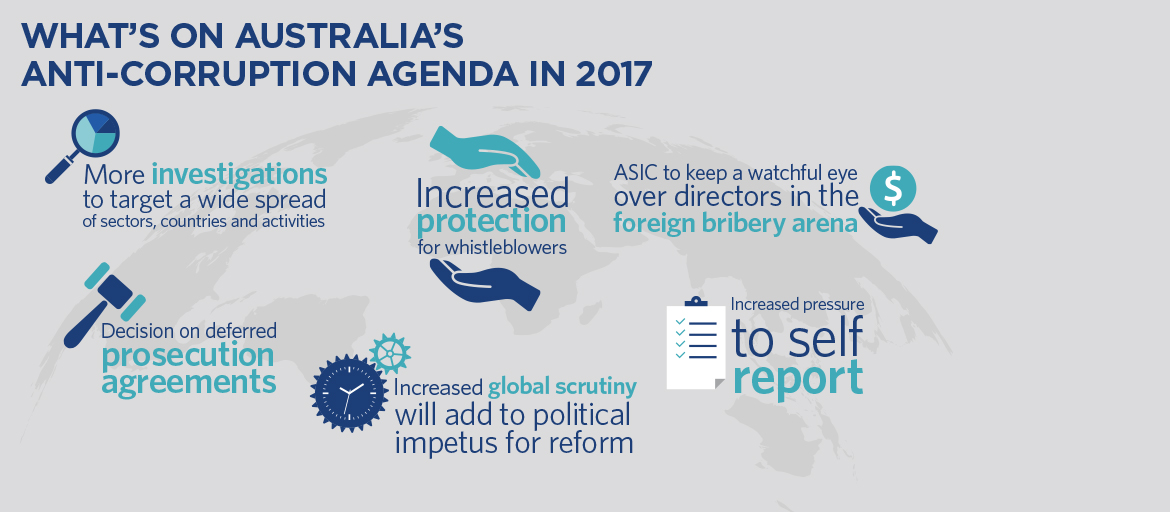Stay in the know
We’ll send you the latest insights and briefings tailored to your needs
In this briefing we provide our predictions for top trends and developments in the foreign bribery space in 2017.

Year on year, the number of active foreign bribery investigations has consistently increased by around 30 per cent since 2014. We expect this trend to strengthen, with the effects of the Commonwealth Government's additional $15 million in funding over 3 years (announced in May 2016) starting to show. The new specialist Australian Federal Police (AFP) teams in Perth, Melbourne and Sydney have been tasked with investigating complex fraud and corruption and will bolster the AFP's capacity to pursue and broaden the reach of investigations. Already the current investigation workload spans a wide range of countries, sectors and activities.
Regulator pressure towards self-reporting is likely to continue to grow. 2016 saw much talk by Australian authorities about their desire to see more corporate self-reporting. The AFP and Commonwealth Director of Public Prosecution’s (CDPP) release of an exposure draft of their best practice Guideline for Self-Reporting of Foreign Bribery in August 2016 is a clear signal of their expectations on corporates in 2017. However, that regulatory pressure alone is unlikely to mark a material increase in self-reporting, unless and until regulatory guidelines provide additional certainty to corporates as to the range of possible outcomes if they self-report.
A decision on deferred prosecution agreements (DPAs) will likely be made during the course of the coming year. This topic has been under active consideration by the Attorney General’s Department since May 2016. Public submissions made to the Attorney General on this topic have been generally supportive of the introduction of this mechanism, while cautioning the need to apply learnings from the existing US and UK models. Since the power became available to authorities in the UK in 2014, 3 DPAs have been entered into – we expect policy development will take account of those successes to date.
Whistleblower reforms will be high on the reform agenda in 2017, with the Commonwealth Government committed to a wider parliamentary inquiry into whistleblower protection following its deal with Senate crossbenchers to pass the Fair Work (Registered Organisations) Amendment Bill 2014.
In addition to extending protections for whistleblowers in the private sector, topics under scrutiny will include internal company mechanisms for dealing with whistleblower reports and the potential introduction of financial incentives for whistleblowers.
Late in 2016, the Australian Securities and Investments Commission (ASIC) had a long awaited success in a breach of directors duties case against the former AWB chair and director, following the heavily reported kickback scandal. ASIC has also appealed its related loss against another officer, sending a clear message that it is prepared to fight on cases that it considers warrant enforcement.
Look for ASIC to maintain its support of, and cooperation with, the AFP in its foreign bribery investigations. ASIC will also be keeping an eye out for clear and derelict breaches of directors and officers duties in a corruption context, and for opportunities to bring further cases where it believes corruption issues have led to false accounting or record keeping.
ASIC will also follow with interest developments on the political agenda – particularly the imminent Senate inquiry report – due March 2017 – on inconsistencies and inadequacies in penalties for white collar crime. Any recommendation to increase penalties for Corporations Act offences that can be deployed in a foreign bribery context will no doubt motivate ASIC to pay even closer attention to this space.
The Organisation for Economic Co-operation and Development (OECD) Working Group on foreign bribery has formerly launched its phase 4 monitoring stage and is expected to commence its next assessment of Australia in 2017. The OECD has indicated that phase 4 monitoring will focus more closely on detection, enforcement and corporate liability.
We expect that this will contribute to continued political focus on driving key reforms in the anti-corruption and foreign bribery space. Other factors set to contribute to this reform push include re-invigorated Senate inquiries, strong interest in issues connected with white collar crime and corruption among minor parties holding the balance of power in the Senate, and the Commonwealth Government’s continuing review of the foreign bribery legal framework.
The contents of this publication are for reference purposes only and may not be current as at the date of accessing this publication. They do not constitute legal advice and should not be relied upon as such. Specific legal advice about your specific circumstances should always be sought separately before taking any action based on this publication.
© Herbert Smith Freehills 2025
We’ll send you the latest insights and briefings tailored to your needs